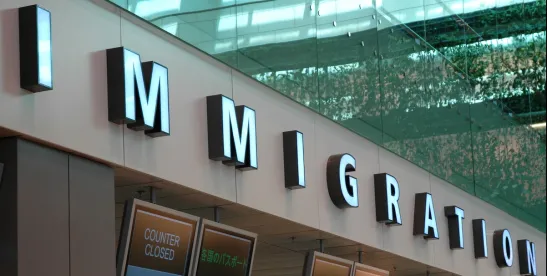The newly enacted One Big Beautiful Bill Act (P.L. 119–21) brings important updates for U.S. employers in the area of immigration compliance. While public focus has been on border infrastructure and enforcement, HR and legal teams should look closely at what the law requires regarding workplace inspections, visa processing, sponsorship documentation, and benefit renewals.
Worksite Enforcement to Increase
The law allocates substantial new funding for Department of Homeland Security (DHS) and Immigration and Customs Enforcement (ICE) worksite enforcement, including I‑9 audits and inspections. However, it does not establish industry-specific quotas or mandatory annual targets. Employers in sectors with significant foreign-born workforces may anticipate more discretionary inspections and should consider reinforcing both I‑9 practices and oversight of subcontracted labor.
Consular and Border Vetting
P.L. 119–21 enhances DHS and Customs and Border Protection (CBP) authority to collect biometric information and strengthens vetting capabilities, but it does not require universal in-person visa interviews or mandate automatic delays at consulates or entry ports. Employers should plan for potentially longer adjudication timelines based on increased enforcement activity, but any delays would result from agency discretion, not statutory requirement.
USCIS Adjudications and RFEs
The law directs the U.S. Citizenship and Immigration Services to standardize adjudication procedures and report trends in Requests for Evidence (RFEs). While this may lead to higher RFE rates, it does not institute a new legal “strict scrutiny” standard that was included in earlier versions of the bill. Employers may expect increased oversight and should bolster petition documentation with precise job descriptions, organizational charts, and supportive evidence.
PERM Labor Certification Reviews
P.L. 119–21 instructs the Department of Labor to prioritize reviews of Permanent Labor Certifications (PERM) applications that show discrepancies between job postings and actual duties, or that differ from prior filings. PERM job postings must accurately reflect real work and should be supported by consistent internal documentation.
Joint‑Employer Liability Omitted
Earlier versions of the bill included language that would have imposed automatic joint-employer liability for I‑9 and visa violations involving contractors. That language was removed from the final version. While no new joint-employer liability has been codified, existing regulations and case law continue to apply. Employers should continue overseeing third-party labor arrangements to manage compliance risk.
TPS, DACA, and EAD Renewals
The final version of the law does not change eligibility for employment authorization documents (EADs), nor does it eliminate the 540-day automatic extension available to Temporary Protected Status, DACA, or parole-based EAD holders. Employers may continue current systems for tracking and renewing EADs, with no changes required based on the law.
Broader Enforcement Context
P.L. 119–21 provides over $100 billion in additional funding through FY 2029 for ICE, CBP, immigration courts, detention capacity, and enforcement technology. This increased funding may significantly expand agency capacity for inspections, audits, detentions, and deportation operations. These effects reflect administrative resource increases; not new statutory restrictions on employers or employees.
Employer Considerations
In light of P.L. 119-21’s enactment, employers may wish to:
- Strengthen I‑9 practices and contractor oversight;
- Include more detailed documentation and corroborating evidence, such as in-depth job descriptions, organizational charts, and proof of employer-employee relationships, when submitting petitions in order to reduce the likelihood of receiving RFEs;
- Ensure PERM filings match actual duties and maintain consistent records;
- Continue timely EAD tracking and renewal processes; and
- Build flexibility into travel and assignment planning to adapt to possible vetting delays.
Conclusion
While P.L. 119–21 expands enforcement funding, inspection capacity, and adjudicative transparency, it does not introduce mandatory audit quotas, universal vetting delays, enhanced legal standards, automatic joint-employer liability, or changes to EAD renewal rules. Employers should update their immigration compliance programs, documentation practices, and operational readiness to match a landscape of expanded administrative capability and oversight.



 />i
/>i

